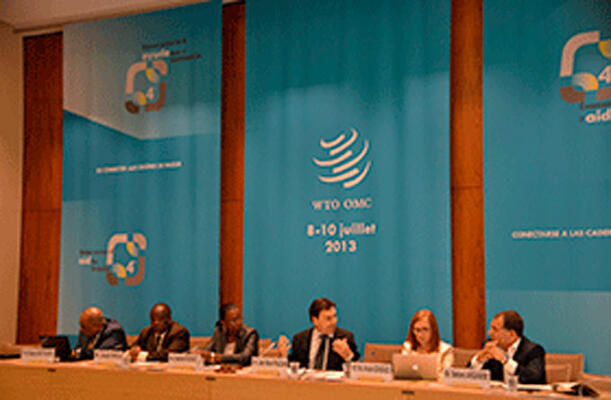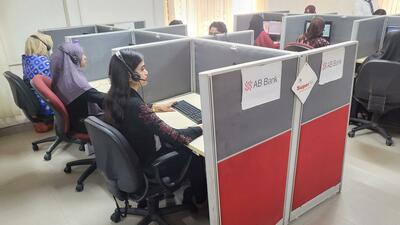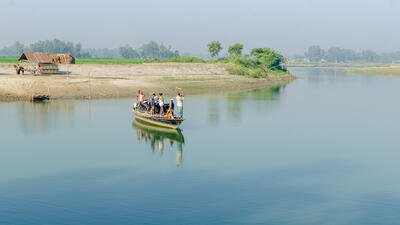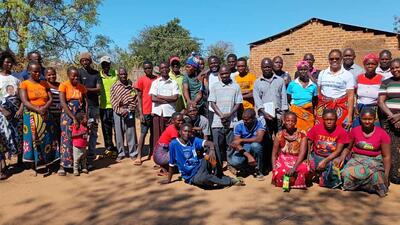
Panel advises policymakers on SME linkages to value chains
Needlessly expensive road transport, a lack of information about clients’ requirements and the absence of international certification present the most important obstacles to the integration of small and medium sized enterprises (SMEs) from developing countries into international supply networks, according to panellists at a side event organized by ITC at the Fourth Global Review of Aid for Trade in Geneva yesterday.
The growing importance of regional and global value chains in international trade provides a unique opportunity to increase exports by SMEs, provided that major obstacles are overcome, according to speakers at the event entitled Incorporating Developing Country SMEs into Value Chains. The panel explored the roles and contributions of policymakers, trade promotion organizations, private sector trade associations and logistics companies in the integration process, and the implications for the various actors.
SMEs require access to finance, skills development and improved capacity in order to meet international quality standards – issues the Aid for Trade initiative must address, said Valentine Rugwabiza, Deputy Director-General of the World Trade Organization (WTO) in opening the debate. SMEs have a particular disadvantage when it comes to the cost of logistics, she said. 'Multinational enterprises can incorporate these costs, but SMEs cannot.'
ITC is developing market-based approaches to connect SMEs from least developed countries (LDCs) to international markets and increase their competitiveness, said Jean-Marie Paugam, ITC’s Acting Executive Director, who moderated the debate. 'Without assistance, players in these countries are bypassed by global value chains', which increasingly dominate international trade, he said.
Understanding client needs
Market knowledge and understanding of value chains are prerequisites for participation in these value chains and for growing farmers’ incomes, said Joseph Nkole, a cotton farmer and the National Coordinator at the Cotton Association of Zambia. Until a few years ago, the Association’s 450,000 members sold raw cotton to buyers locally at low rates. Working with ITC, they have since identified new markets and forged close ties with buyers in China, India, Bangladesh and Viet Nam. 'We started to find out what our clients needed,' Nkole said, adding that Zambian cotton producers moved up the value chain by ginning their own cotton and selling the fiber and seed separately. 'What holds back most SMEs in participating in and moving up the value chain is lack of understanding of their own markets,' he concluded.
Simplifying border procedures
Once SMEs in LDCs identify a market need, they need to get their products to those markets. Transportation costs, however, are often two to three times as high in Africa than in Europe, rendering suppliers from these countries uncompetitive, said a representative of the transport and logistics management industry. Due to slow customs procedures and roadblocks inside countries, delivery often takes twice as long as necessary, he explained.
'Staying two days, one week, two weeks at the border is very costly,' he said, adding that 'bad governance issues' at such customs posts and roadblocks further increases truckers’ costs and create incentives to bypass normal procedures.
Several countries have taken steps towards simplifying processes at their border posts, significantly reducing the amount of waiting time and thereby increasing the competitiveness of their exporters and boosting their economies, he said. At border crossings between Zambia and Zimbabwe, for instance, a simplified process has been put in place, resulting in a reduction of waiting times from around five days to one day or less, he said.
The world’s largest logistics companies that have a global presence work with SMEs in several countries, advising them on the practicalities of customs procedures and border crossing issues. 'We provide input from the private sector to build leadership in the movement of goods,' he said.
Targeting trade policy
Trade policy has to be targeted in order to be effective, said Dr Debapriya Bhattacharya of the Centre for Policy Dialogue in Dhaka, Bangladesh, and former Ambassador of Bangladesh to the WTO. Countries first need to decide which sectors and which size of companies to target for SME support, he said. At the same time, they must focus on retaining value addition. 'The success story lies not in entering the value chain but in climbing up the value chain. Entry is not good enough if diversifying and scaling up are not there,' he said.
Creating the right policy environment, strengthening the institutional network to support exporters and devising the right set of economic incentives are the areas policymakers must focus on in order to facilitate exports by SMEs, said Anabel González, Costa Rica’s Minister of Foreign Trade. In 2001, Costa Rica embarked on a programme to match local SMEs with multinationals (MNEs), but officials soon realized that more was needed. 'It is not only a matter of putting SMEs and MNEs together but developing SMEs so they can supply MNEs,' she said, highlighting the need to support companies in obtaining international certification, often a prerequisite to becoming suppliers to multinationals.
Costa Rica has carved out a niche for itself in areas of higher value such as medical devices, she said, adding that countries that focus on competing solely on costs will lose out. 'If you compete on price there will always be a country that can do it more cheaply,' Ms González said. Costa Rica, for instance, used to be a major supplier of textiles, but its companies soon found themselves outbid by competitors elsewhere in Central America. Instead of trying to compete on price, the country moved into the field of medical devices, where many of the skills used in the textiles industry were convertible, she said. 'We moved to a different value chain with more value added, but built on the skills already acquired in other sectors,' she explained.
In evaluating its impact in trade support, the Costa Rican government tracks the value of the first purchase order signed by the companies as a result of the assistance received, Ms González said. 'We have registered a 13-fold increase in 12 years and this is an important measure of progress,' she said.
What should ITC do?
ITC must continue its work in strengthening trade promotion organizations in beneficiary countries, Ms González said. 'Support TPOs developing certification programmes for exporters.'
Information asymmetry remains an important obstacle, and ITC’s assistance in this area is particularly welcome, said Mr Nkole.
ITC needs to work with other players to bring more transparency into how value is distributed within supply chains, Dr Bhattachraya said. In order to increase the income of suppliers in developing countries, development actors must first 'trace how MNEs redistribute value.'
ITC could take on a role in forging public-private partnerships to share best practices in the area of transport and logistics policy, the panellist from the logistics industry said, adding that industry players stood ready to support such an initiative.
Ms Rugwabiza quoted WTO Director-General Pascal Lamy in saying that development actors 'need to connect the least connected,' and added that 'the very least connected are SMEs from developing countries and the very, very least connected are SMEs from low income countries and LDCs.' ITC and other development actors must focus on these most vulnerable exporter groups, she said.
Mr Paugam concluded the session by emphasizing the need for ongoing assistance in certification and the creation of market linkages. He called on trade development agencies to cooperate on further research on the economics of value chains and for the establishment of a public-private platform for ongoing dialogue and sharing of best practices in policymaking.















